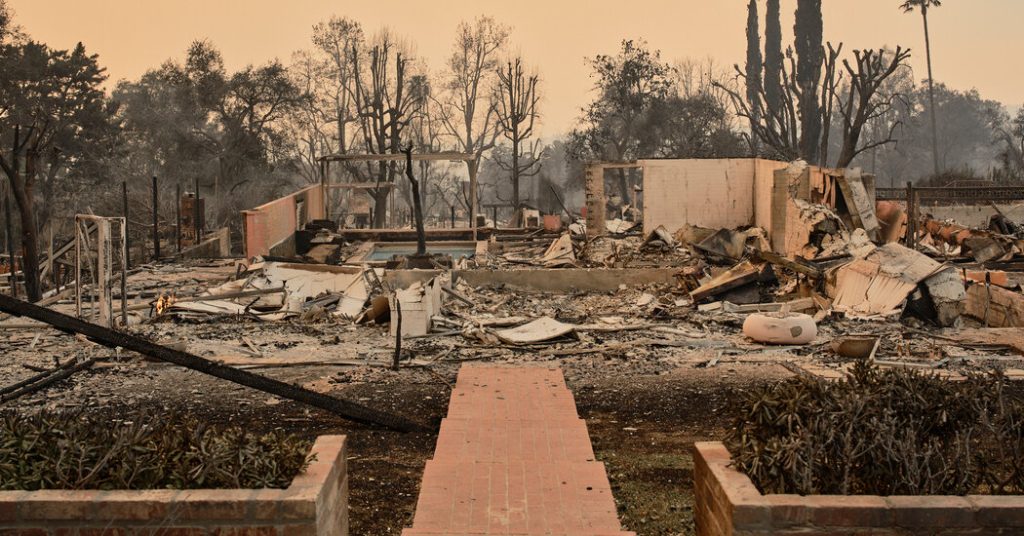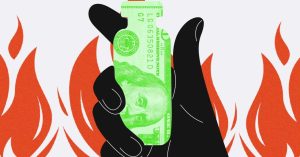If your home was damaged or destroyed by the fires in Los Angeles, the most daunting challenge may still be ahead: Getting your insurance company, or the federal government, to give you the money you’re entitled to receive.
That process can be infuriating and baffling, and it comes during what is already an incredibly stressful moment in your life. Worse still, the stakes are enormous. You can’t afford to get it wrong.
The New York Times asked experts what to do, and what to avoid. Their advice boils down to two points: You don’t need to settle for whatever your insurance company or FEMA first offers you. And you don’t have to fight them alone.
Document everything
Photograph the damage to your home as soon as you can. Every time you speak to anybody from your insurance company or from a government agency, make notes about the conversation, including whom you spoke with, when it happened, and what the person said.
If you spend money on repairs or supplies while you’re out of the house, keep all receipts.
Your insurance payout won’t be easy
Your main source of money for repairing or rebuilding your home is your insurance company. Recovery depends on getting the most money allowed under your policy. And that won’t be easy.
“People have to be prepared to fight to have the terms of their contracts met,” said Douglas Heller, director of insurance at the Consumer Federation of America.
There are a few things to keep in mind when you get an offer from your insurance company, Mr. Heller said. First, ask yourself whether the amount you’re being offered is enough to repair or rebuild your house. Second, check to see if you’re being offered to maximum amount allowed under your contract.
If you’re being offered less money than you think you need and less money than your contract allows, Mr. Heller said, then you need to push back. And the best way to do that is to get help from an expert.
David A. Sampson, president and chief executive of the American Property Casualty Insurance Association, which represents insurers, said in a statement that “the insurance industry is a crucial partner in rebuilding after a disaster.”
“Insurers plan for major events like this and are committed to providing claims assistance to policyholders as expeditiously as conditions on the ground permit,” Mr. Sampson said, referring to the fires in California. “Additional claims staff and resources have been mobilized to help impacted families initiate and get their claims handled as quickly as possible.”
When to call a public adjuster
If you feel your insurer is offering you less money than you’re contractually entitled to, one option is to call a public adjuster. These are independent professionals whose job is to assess the damage to your home and then negotiate with the insurance company to get whatever is allowed under your policy.
“A public adjuster is most effective when he or she is involved in the beginning of the matter,” said Jeffrey Major, a public adjuster who has helped sort through insurance claims after big disasters, including Hurricane Katrina in 2005, Superstorm Sandy in 2012 and last year’s wildfire in Lahaina on Maui.
“When I’m involved in the matter from day two or three, I can get in and gather the evidence I know the insurance company is going to need, and if I’m meeting the insurance adjuster, that’s going to be best for the homeowner or the business owner.”
Using a public adjuster isn’t free. They’re typically paid a portion of your insurance settlement, somewhere around 10 percent. But in exchange, they can often get a larger settlement than what you might get on your own.
Your state insurance office might help
You should also consider contacting your state’s department of insurance, which typically has an office that hears consumer complaints. You can call the California Department of Insurance at 1-800-927-4357, or file an online consumer complaint here.
If you initiate a complaint against your insurer, be sure to copy your insurer on that correspondence.
Don’t count on the state agency to intervene with your insurer, Mr. Heller said. The goal is to show your insurer that you’re not going to give up without a fight. If the state sees a pattern of insurers mistreating people, it might choose to intervene more broadly, by telling insurers to change their practices, Mr. Heller said.
When should you call a lawyer?
If you still can’t get a satisfactory settlement, the nuclear option is to call a lawyer. But don’t push the button right away.
Hiring a lawyer too soon “comes across as combative,” Clifford Nkeyasen, a Dallas-based attorney who sues insurance companies on behalf of claimants, told The New York Times in the fall, after Hurricane Helene tore through North Carolina.
Also, judge the size of the gap between what you’re seeking and what your insurer is offering. “If you think the contents of your house are worth $100,000 and they’re sending you a check for $10,000, that’s the time to hire an attorney,” Mr. Nkeyasen said.
How do you get help from FEMA?
Your other main source for help is likely to be the Federal Emergency Management Agency. FEMA’s assistance programs won’t take the place of insurance, but they can still offer important kinds of help.
Some of that help can arrive quickly. FEMA offers disaster survivors a one-time payment of $770. That money is meant to be used for immediate needs, such as food or other supplies, for people who had to leave their homes. The program is a grant, not a loan: If you get the $770, you do not need to pay it back.
But that’s not the only help FEMA offers. The agency has a program called Individual Assistance that provides emergency housing assistance to people affected by disasters. (FEMA also offers many other types of assistance, including money to stay in a hotel, repair a vehicle, pay for emergency medical expenses and cover child care.) The Individual Assistance program is open for applications from people in Los Angeles County who were affected by the fires.
To find out if you qualify for FEMA’s $770 payment, or other types of individual assistance, visit www.disasterassistance.gov or call 1-800-621-FEMA (1-800-621-3362).
It sounds obvious, but be sure to answer all the questions in your application carefully. Many applications get rejected because of seemingly mundane errors, such as misspelling your name, or entering the wrong Social Security Number.
After FEMA receives your application for housing repair, the agency will send somebody to inspect the damage or use aerial images. It’s important to know that the program is designed to provide the money necessary to make your home livable, not what it costs to fully repair your home. The amount of money FEMA can provide for home repairs is capped this year at $43,600.
Don’t be afraid to appeal your FEMA award
If your home was completely destroyed by the fire, and you either didn’t have insurance or were underinsured, you should receive that maximum $43,600 grant, according to Reese May, chief strategy and innovation officer with SBP, a disaster resilience and recovery nonprofit organization that helps survivors navigate FEMA assistance.
Mr. May recommends that people who receive less than that amount should appeal.
Even if your home was only partially damaged and your FEMA award is less than $43,600 and does not cover what you need, you can appeal.
Just 3 percent of people whose applications are rejected by FEMA appeal, according to reporting by my colleague Hannah Dreier. But the benefit of filing an appeal can be huge, even for people whose application was successful but felt their award was too small. “About half the time, we can double the amount of assistance that survivors get,” Mr. May said.
Mr. May noted that because the scale of the wildfires, people may have an even harder time than usual getting help. “Survivors must be vigilant and persistently advocate for themselves,” he said.
You don’t need to navigate that appeal on your own. SBP is offering free help to homeowners who were affected by the fires and want to appeal a FEMA award. You can contact them at www.sbpusa.org/get-help/. The group said it was also training local nonprofit groups to help with appeals.
What if you lose all your documents in a fire?
If your lost all your documents, including the title to your home, it will complicate the process of getting assistance from FEMA. An agency spokesman said that while it’s possible for somebody without identification to apply for aid, that person will need to obtain replacement identification before receiving that aid. The reason, he said, is to prevent fraud.
Working with your insurance company should be easier, according to the insurance association. Insurers usually don’t require that proof that you owned the home before receiving a settlement. But if you do need to produce a title document, you should be able to get a duplicate from the county government, where those documents are usually held on file.
What else can you do?
If you don’t get enough money from insurance or FEMA to repair your home, you have other options.
Some people take low-interest loans from the U.S. Small Business Administration. (Contrary to what the agency’s name suggests, you do not need to be a small business to qualify.) Others set up GoFundMe accounts, which generated more than $106 million in donations for disaster recovery in 2023, though research has shown those campaigns disproportionately benefit wealthier disaster survivors. And many charities help people uprooted by calamities.
If a disaster is big enough, Congress will sometimes provide additional funding through the U.S. Department of Housing and Urban Development’s disaster recovery program. Unlike FEMA aid, that money can often be used to pay the cost of rebuilding homes. But that aid is entirely at the discretion of lawmakers.





